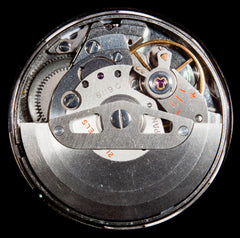Quartz vs. Manual vs. Automatic Watches - Differences, Advantages and Disadvantages
At the heart of a watch is it’s ‘movement’, which is the mechanism that moves the hands of the watch and keeps time. Put simply, all analog watches consist of parts and gears that regulate the movement of the hands on the dial. The main difference between Quartz, Manual, and Automatic is in the power source. Each type of movement has its own distinct character, as well as its own advantages and disadvantages.
Quartz:
These movements are named as such because of the quartz crystal inside, that works in tandem with a battery to keep time. A battery for this type of watch typically lasts for a year or two. Quartz movements are generally considered to keep the most accurate time, and are easy to maintain (most often, a malfunctioning watch simply needs a new battery).
Here is a breakdown of how the quartz movement works:
- An integrated circuit provides power to the quartz crystal from the battery
- This electricity causes the crystal to vibrate at a specific rate of 32,768 vibrations per second
- These vibrations create electrical pulses that are then carried via the integrated circuit to the stepping motor
- Every 32,768th electrical pulse is forwarded by the stepping motor to the dial train
- The dial train moves the hands of the watch

Manual and Automatic (Mechanical):
Both manual and automatic movements can be classified as mechanical movements. Manual movements are the oldest known type of watch movement, can can be traced all the way back the 1500s. Typically found in high-end, luxury watches, manual movements must be wound in order to generate the needed power to make the watch run. Some watches need to be wound daily.
Here is how a manual movement works:
- The user turns the crown, which winds and tightens the mainspring, resulting in stored energy
- As the mainspring gradually unwinds, energy is released
- This energy is transferred to the escapement by the gear train
- The escapement regulates the energy into controlled portions
- The balance wheel uses this energy to beat back and forth at a steady pace
- After a certain number of beats, the dial train uses some of the energy to advance the hands of the watch
Automatic Mechanical
An automatic watch works in much the same way, however it doesn’t require winding, as it is powered by the movement of your wrist. Automatic watches have a rotating metal weight attached to the mainspring, called a rotor. Aside from this rotor, an automatic movement works the same way that a manual one does. Automatic watches need to be wound if they are not worn, however, as without wrist movement they have no source of power. That said, some models offer a manual "hack" option to wind the coil without prolonged movement.
Which movement is right for you?
The answer to this question will depend on your individual needs. Here are the key advantages to each type:
Quartz:
Price - Even a luxury quartz watch can be bought for quite a bit less than a mechanical model.
Ease of Use - Unlike mechanical watches, which require maintenance every few years (often costing a few hundred dollars), quartz watches merely need to have their batteries changed every one or two years.
Daily Attention - Quartz watches never need winding and don’t need to be worn every day, which undoubtedly makes them the right choice for someone who doesn’t want or have the time to worry about whether their watch is wound.
Accuracy - Unlike mechanical watches, which rely heavily on tiny, delicate parts that can easily be affected by magnetism or changes in temperature, quartz watches are better equipped to deal with these variations.
Mechanical (Automatic or Manual):
Craftsmanship - Owners of mechanical watches appreciate the intricate craftsmanship that goes into the movements. Watch movements are truly fascinating, and many of the bigger brands have in-house movements that have been used for decades.
Durable - Mechanical watches often last for generations.
Long Term Value - Mechanical watches are considered more prestigious than quartz and will often retain their value or even become worth more in some cases.
It’s important to note that there is no universal ‘right’ or ‘wrong’ choice to make with regards to watch movements. It is simply a matter of choosing the movement that best suits your needs and lifestyle.





